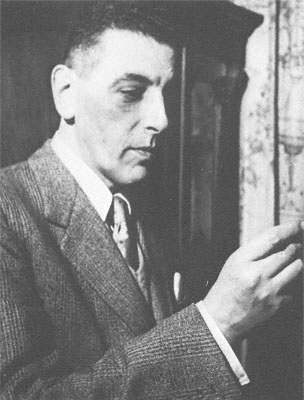- Fredric Warburg
Infobox Writer
name = Fredric John Warburg

birthdate = birth date|1898|11|27|mf=y
birthplace =London ,England
deathdate = death date and age|1981|5|25|1898|11|27|mf=y
deathplace =London ,England
occupation =Publisher ;author Fredric John Warburg (
November 27 ,1898 -May 25 ,1981 ) was an English publisher best known for his association with the British authorGeorge Orwell . During a career spanning a large part of the 20th century and ending in 1971, Warburg publishedOrwell 's "Animal Farm " (1945) as well as "Nineteen Eighty-Four " (1949), and works by other leading figures such asThomas Mann andFranz Kafka . Other notable publications include the controversial "The Third Eye " byLobsang Rampa in 1956,Pierre Boulle 's classic "The Bridge over the River Kwai ",Adolf Hitler 's "Mein Kampf ", andWilliam Shirer 's "The Rise and Fall of the Third Reich " (1960).Life
Warburg was born on
November 27 ,1898 , to John Cimon Warburg (a photographer) and Violet Amalia (née Sichel), both of Jewish descent. At the age of 9 Warburg was sent to Wilkinson's boys prep school and then later won a scholarship to attend the prestigiousWestminster School . He was to describe his first two years as 'among the most hateful of my life'. ["An Occupation for Gentlemen", Fredric Warburg, Hutchinson, London, 1959, p. 30.] Whilst he excelled academically, as a Jew he often felt an outsider and he was to find refuge and solace in his love of books.In summer 1917 Warburg was commissioned to serve as an officer in theRoyal Artillery and was stationed in theYpres area until the end of the war. After demobilization, Warburg was to read chemistry atChrist Church, Oxford , but later switched to classics and philosophy, proceeding to become an MA in 1922. That same year he was to start his publishing life as an apprentice at the publishing firm ofRoutledge & Sons Ltd.Warburg's first marriage (July 5 1922 ), to May Nellie Holt, was to produce three sons but ended in divorce in 1932. A year later, onJanuary 21 1933 , Warburg married the painter and designer Pamela Bryer (née de Bayou, widowed) and they were to have a son that died of a brain haemorrhage within twenty-four hours of birth.DuringWorld War II Warburg served as a corporal in the Home Guard, in the same section where Orwell held the rank of sergeant.Fredric Warburg died of heart failure atUniversity College Hospital ,London , onMay 25 1981 at the age of 82.Work
Upon his appointment as an apprentice at the firm of
Routledge & Sons Ltd, Warburg found himself under the tutelage of William Swan Stallybrass, a man he regarded as 'the greatest scholar-publisher of his day'. [ibid., p. 121.] Stallybrass died in 1931 and Warburg was to become increasingly dissatisfied with his post atRoutledge , leading to his eventual dismissal from the company in 1935. Later that same year, he andRoger Senhouse were to purchase the publishing firm ofMartin Secker (that was in receivership) and renamed it asSecker and Warburg . The firm became renowned for its political stance, being both anti-fascist and anti-communist (at least communism in itsSoviet incarnation), a position that put them at logerheads with the ethos of many intellectuals of the time. WhenGeorge Orwell parted company withVictor Gollancz over "The Road to Wigan Pier ", it was to Secker and Warburg that he took his next book "Homage to Catalonia ". Thereafter they were to publish all of Orwell's work, with author and publisher becoming intimate friends. With its financial position devastated by paper shortages during and after the war, Secker and Warburg were forced to join theHeinemann group of publishers in 1951. During the 1950s and 1960s Secker and Warburg were to publish the works of, amongst others,Simone de Beauvoir ,Collette ,Alberto Moravia ,Günter Grass ,Angus Wilson ,Melvyn Bragg and Julian Gloag. In 1961 Warburg was made a director of the Heinemann group, a post he retained until his retirement in 1971. He also published two volumes of autobiography: "An Occupation for Gentlemen" (1959) and "All Authors are Equal" (1973).Controversy
In 1952 Warburg became a member of the committee of the Society for Cultural Freedom (S.C.F.), an organisation established to 'promote Western culture and defend it against the communist culture of the East' ["All Authors are Equal", Fredric Warburg, Hutchinson, London, 1973, p. 154.] .The S.C.F. were to produce a cultural magazine known as
Encounter , which was later to receive sustained criticism when it emerged that much of the money used to produce the magazine came directly from theCIA .More controversy was to follow in 1954 when Warburg was prosecuted for publishing the supposedly obscene book "The Philanderer" byStanley Kauffmann . Although offered the chance to plead guilty and escape with a minimal fine, Warburg opted for the much riskier option of a public trial by jury at theOld Bailey . This decision was vindicated when he was unanimously acquitted by the jury. The presiding judge's summing up was added as an appendix in later editions of "The Philanderer " and also published separately bySecker and Warburg .Bibliography
Books written by Fredric Warburg
*"An Occupation For Gentlemen" (1959)
*"All Authors are Equal" (1973)Publications relating to Fredric Warburg
*"The summing-up by Mr Justice Stable in Regina v. Martin Secker & Warburg Ltd., Fredric J. Warburg, The Camelot Press Ltd ("The Philanderer" case) at the Central Criminal Court July 2, 1954" (1954)
External links
* [http://www.oxforddnb.com/public/index/47448.html Entry for F. J. Warburg at the Oxford Dictionary of National Biography] Brief bio of F. J. Warburg
Notes
Persondata
NAME=Warburg, Fredric
ALTERNATIVE NAMES=Fredric John Warburg
SHORT DESCRIPTION=publisher ,author
DATE OF BIRTH=November 27 ,1898
PLACE OF BIRTH=London ,United Kingdom
DATE OF DEATH=May 25 ,1981
PLACE OF DEATH=London ,United Kingdom
Wikimedia Foundation. 2010.
